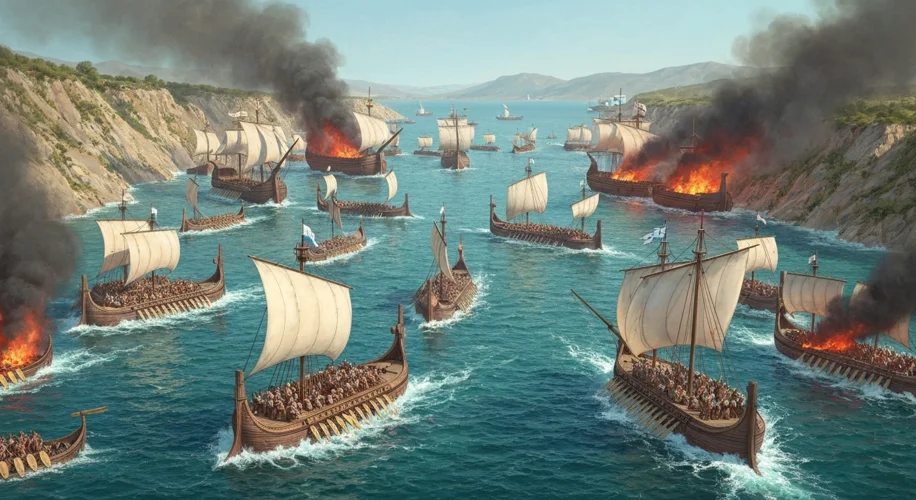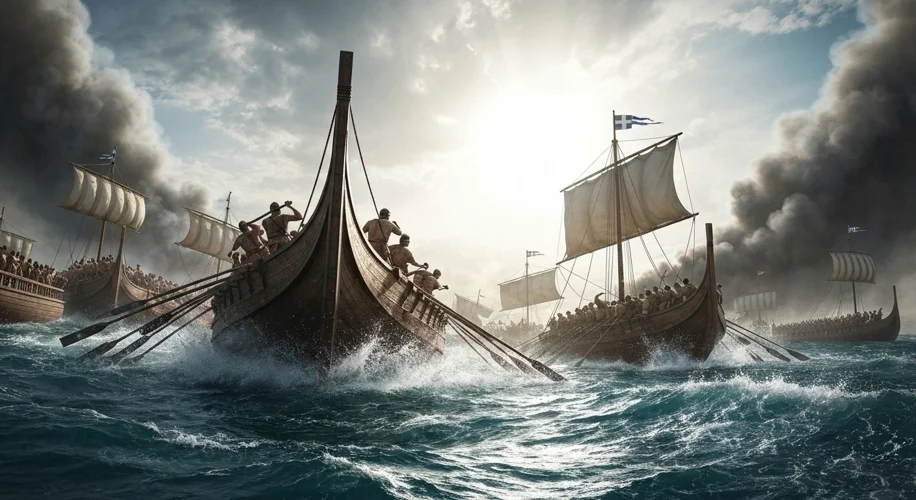The year is 480 BCE. The air in the Aegean Sea is thick with anticipation, a prelude to a clash that would echo through millennia. On one side, the colossal might of the Persian Empire, led by the seemingly invincible King Xerxes, whose ambition was to swallow Greece whole. On the other, a beleaguered coalition of Greek city-states, their very survival hanging precariously in the balance.
For years, the shadow of Persia had loomed large. Xerxes, inheriting his father Darius’s thirst for vengeance after the Athenian victory at Marathon, had assembled an invasion force of unprecedented scale. Herodotus, our primary ancient source, paints a vivid picture of this immense host, a force so vast it drank rivers dry. This wasn’t just a military campaign; it was a subjugation, an attempt to extinguish the burgeoning spirit of Greek democracy and cultural identity.
The Greeks, notoriously fractious and often at odds with each other, found themselves united by a common, existential threat. Athens, a burgeoning naval power, and Sparta, the land-based warrior elite, formed the backbone of this resistance. However, internal divisions and varying levels of commitment plagued the Greek alliance. The Persian advance had been relentless, culminating in the heroic but ultimately doomed stand of the Spartans and their allies at Thermopylae. Following this defeat, the Persians marched south, sacking Athens and burning its temples, a devastating blow that tested the resolve of every Greek.

Into this grim reality stepped Themistocles, the brilliant Athenian strategist. While many advocated for a defensive stand on land, Themistocles understood that Greece’s salvation lay not on the dusty plains, but on the unforgiving expanse of the sea. He had masterfully orchestrated the construction of a powerful Athenian navy, funded by newly discovered silver mines. Now, he saw his chance to use this fleet to decisively cripple the Persian war machine.
The stage was set in the narrow straits of Salamis, a body of water strategically chosen by Themistocles. It was a gamble, a desperate ploy to neutralize the Persians’ overwhelming numerical superiority. The Persian fleet, eager to pursue the fleeing Greeks, sailed into the strait, a vast armada packed tightly together. The Greeks, with their lighter, more maneuverable triremes, were waiting.
The battle itself was a maelstrom of splintering wood, clashing bronze, and the cries of men. The narrow confines of the strait worked to the Greeks’ advantage. They could outmaneuver the larger, more cumbersome Persian ships, using their speed and agility to ram and board their enemies. Themistocles had lured Xerxes into a trap, and the Persian fleet, caught in a chaotic melee, began to break. Panic spread as ships collided, their oars becoming entangled, their hulls vulnerable. The might of Persia, so confident and vast, was being systematically dismantled by a smaller, more unified force fighting on their home turf.
The consequences of Salamis were nothing short of monumental. The Persian navy was decimated, its ability to supply and support Xerxes’ land army severely compromised. Facing dwindling supplies and the prospect of further naval defeats, Xerxes was forced to retreat back to Asia, leaving a portion of his army behind under the command of Mardonius. The following year, the remaining Persian forces were decisively defeated on land at the Battle of Plataea, marking the final end of Xerxes’ invasion.
Salamis was more than just a naval victory; it was a turning point that preserved the nascent Greek civilization. Had the Greeks lost, the trajectory of Western civilization might have been irrevocably altered. The flourishing of Athenian democracy, philosophy, art, and science – the very foundations of so much of what we cherish today – might have been stifled under Persian rule. Themistocles’ audacious strategy, coupled with the courage of the Greek sailors, secured a future for a way of life that celebrated individual thought and civic participation, a stark contrast to the autocratic rule of the Persian Empire.
Picture this: the salty spray stinging your face, the thunderous crash of ramming hulls, the desperate struggle for survival. The sailors of Salamis, Athenian, Corinthian, and from other allied city-states, were not just fighting for territory; they were fighting for their homes, their families, and their freedom. Their victory wasn’t just a tactical triumph; it was a testament to human ingenuity, strategic brilliance, and the indomitable spirit that can arise when a people are united against overwhelming odds. The echoes of their triumph still resonate, a powerful reminder of how a single battle can shape the destiny of the world.

